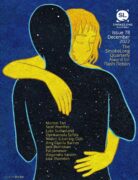Your story’s narrative form—unfurling a long list of both concrete and abstract items of varying importance—creates a very interesting dual effect: On the one hand, the more consequential items (e.g., infidelity) end up partially obscured by the mundane ones, suggesting the former may not be quite as impactful as they first seemed. On the other hand, the sheer scope of the list begins to overwhelm the reader after a while, forcing them to “feel” the accumulated weight of all the items, and some do become “heavier” by appearing more than once. What drew you to this approach?
This story started with the most mundane of reflections and a self-frisk to confirm: Have I got with me everything I need (typically, phone, wallet, keys)? However, reciting that trivial list made me think of what else we carry with us, either by intention or by accident, whether important or mundane, tangible or otherwise. How that list might evolve over time seemed to contain the germs of a story (influenced, of course, by Tim O’Brien’s The Things They Carried).
In terms of the dual effect you note above, life’s an accumulation of small details; some stick with us, others fall away. However, their impact at one moment in time is not necessarily correlated with whether you still carry them down the road. So, for example, in this story, I was trying to illustrate how things that seem important, even dire, at the time may lose their significance over time (e.g., an incident of infidelity that a couple survives) but never quite disappear. At the same time, things we thought we’d put behind us (for example, the narrator’s regret that he didn’t win the childhood fight) will rear their heads at the darndest times in rare spasms of shame. Other details amount to no more than useless trivia, but the fact that they stick with us is both a source of amusement and a badge identifying us by generation and youthful habits.
Time also plays a unique role in your story in that the events referenced throughout span a virtual lifetime, yet the timeline folds over on itself in several places, forcing the past, present, and future to coexist. In this way, the narrative coalesces around the various patterns that emerge from the details (e.g., the narrator still bothered by having lost the aforementioned fight). Ultimately, then, do you see time as the cause of or release from the issues that have roiled both these individuals and this relationship?
Everything the narrator carries, he picks up at a moment in time, but as these items accumulate, they are carried side by side and simultaneously with other burdens, which influence and affect each other. One source of shame may recall other shames. One source of present triumph may be a triumph in part because it’s a recompense for a prior failure.
Some of the details here are always happening. They had a start but not an end. With this couple, time generally plays a mellowing role: Betrayal still hurts, but its edges have softened, making it possible to live with this pain that’s being carried. Forgiveness in this relationship is not a matter of forgetting but of acknowledgment. Time doesn’t so much pass as it accumulates, like every item on the narrator’s list.
Similarly, many aspects of pop culture are woven into the story, affecting the characters in both positive (the sentimentality of keeping the ticket stub from their first date) and negative ways (the narrator’s discovered Tinder account). Whether in general or just within this story, do you tend to view our collective relationship with pop culture as something that enhances our daily lives, providing concrete items through which we can better express certain emotions, or as something that distracts and even intrudes?
Pop culture references are the way we conjure worlds. We litter such references around like dogs pissing in the four corners of their territory. We use them to recognize both our contemporaries and our tribe. They are buoys to mark a channel. A secret handshake.
Within this story, pop culture particularizes the age of the narrator and his wife. It helps the narrator reflect ruefully on past silliness (the mythology of their relationship would have been better served by, say, Casablanca than The Cell) as well as a continuing present inclination to the latest, perhaps empty, fad (pickleball).
However, for me, that’s all pop culture does: It’s a way of situating oneself or recognizing others. Once situated, we face the more pressing and intimate matters of our daily lives, for which pop culture is only context.
Finally, I think your handling of the point of view brings a lot to the story, as you constantly shift back and forth between the singular (“I”) and plural (“we”) first-person pronouns. It seems to me that echoes the aforementioned themes while also striking a compelling balance between the specific (e.g., the narrator carrying “a small cupped flame for [their] high school girlfriend”) and the universal (e.g., “the horror of getting old”). Do you believe the narrator’s ability to speak for his partner’s feelings is a testament to their communication, to their having grown together as a couple, or is there something else at play here?
My narrator probably thinks he knows more about his wife than he really does, because he’s that kind of guy, for better or, usually, worse. However, what he does know, he knows for certain. It’s less a matter of communication than endurance, less a matter of intention than shared experience. They have been together too long not to see each other’s flaws, and the narrator in particular knows he’s sinned more than been sinned against. They are well beyond dreams of perfection, have settled into contentment, and can confidently, if annoyingly, complete each other’s sentences, such that there is less of a difference between “I” and “we” than there was when they first met but not, certainly, a perfect overlap.



 The core workshop of SmokeLong Fitness is all in writing, so you can take part from anywhere at anytime. We are excited about creating a supportive, consistent and structured environment for flash writers to work on their craft in a community. We are thrilled and proud to say that our workshop participants have won, placed, or been listed in every major flash competition. Community works.
The core workshop of SmokeLong Fitness is all in writing, so you can take part from anywhere at anytime. We are excited about creating a supportive, consistent and structured environment for flash writers to work on their craft in a community. We are thrilled and proud to say that our workshop participants have won, placed, or been listed in every major flash competition. Community works.